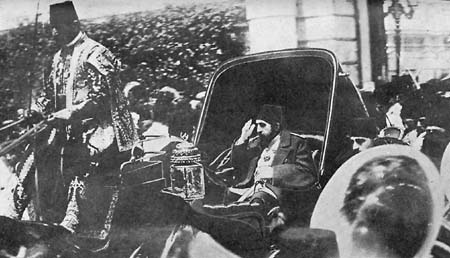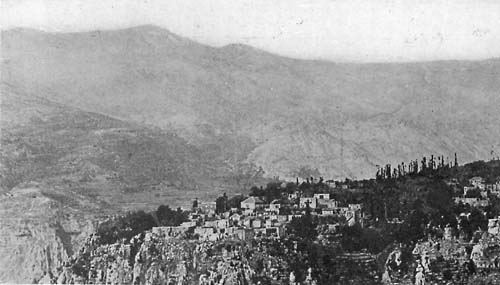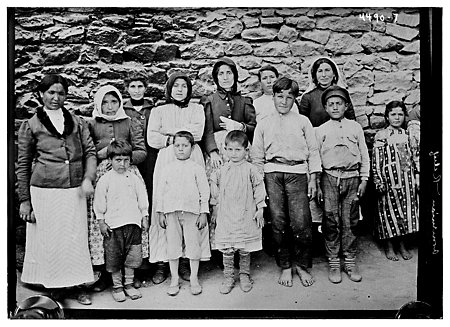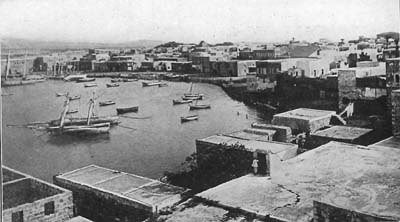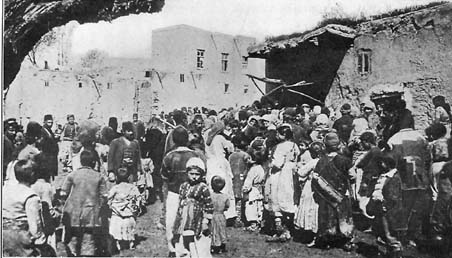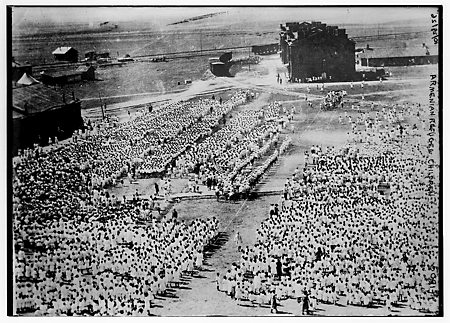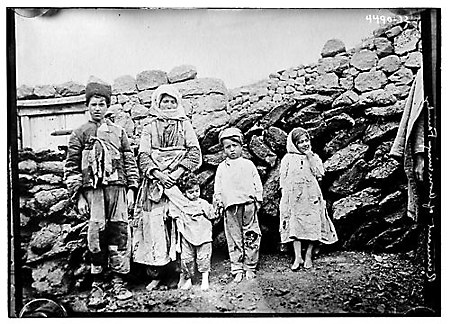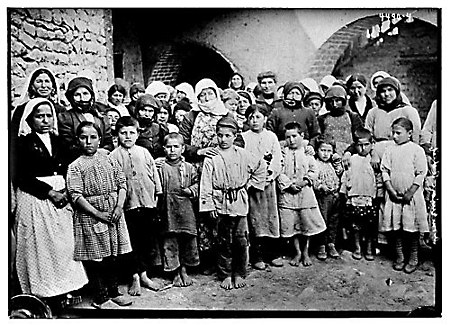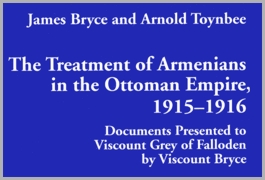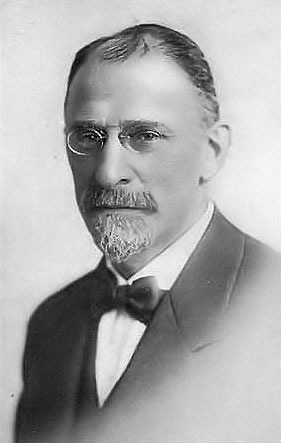 
© 1918.
The destruction of the Armenian race in 1915 involved certain difficulties that had not impeded the operations of the Turks in the massacres of 1895 and other years. In these earlier periods the Armenian men had possessed little power or means of resistance. In those days Armenians had not been permitted to have military training, to serve in the Turkish army, or to possess arms. As I have already said, these discriminations were withdrawn when the revolutionists obtained the upper hand in 1908. Not only were the Christians now permitted to bear arms, but the authorities, in the full flush of their enthusiasm for freedom and equality, encouraged them to do so. In the early part of 1915, therefore, every Turkish city contained thousands of Armenians who had been trained as soldiers and who were supplied with rifles, pistols, and other weapons of defense. The operations at Van once more disclosed that these men could use their weapons to good advantage. It was thus apparent that an Armenian massacre this time would generally assume more the character of warfare than those wholesale butcheries of defenseless men and women which the Turks had always found so congenial. If this plan of murdering a race were to succeed, two preliminary steps would therefore have to be taken: it would be necessary to render all Armenian soldiers powerless and to deprive of their arms the Armenians in every city and town. Before Armenia could be slaughtered, Armenia must be made defenseless. In the early part of 1915, the Armenian soldiers in the Turkish army were reduced to a new status. Up to that time most of them had been combatants, but now they were all stripped of their arms and transformed into workmen. Instead of serving their country as artillerymen and cavalrymen, these former soldiers now discovered that they had been transformed into road labourers and pack animals. Army supplies of all kinds were loaded on their backs, and, stumbling under the burdens and driven by the whips and bayonets of the Turks, they were forced to drag their weary bodies into the mountains of the Caucasus. Sometimes they would have to plough their way, burdened in this fashion, almost waist high through snow. They had to spend practically all their time in the open, sleeping on the bare ground---whenever the ceaseless prodding of their taskmasters gave them an occasional opportunity to sleep. They were given only scraps of food; if they fell sick they were left where they had dropped, their Turkish oppressors perhaps stopping long enough to rob them of all their possessions---even of their clothes. If any stragglers succeeded in reaching their destinations, they were not infrequently massacred. In many instances Armenian soldiers were disposed of in even more summary fashion, for it now became almost the general practice to shoot them in cold blood. In almost all cases the procedure was the same. Here and there squads of 50 or 100 men would be taken, bound together in groups of four, and then marched out to a secluded spot a short distance from the village. Suddenly the sound of rifle shots would fill the air, and the Turkish soldiers who had acted as the escort would sullenly return to camp. Those sent to bury the bodies would find them almost invariably stark naked, for, as usual, the Turks had stolen all their clothes. In cases that came to my attention, the murderers had added a refinement to their victims' sufferings by compelling them to dig their graves before being shot. Let me relate a single episode which is contained in one of the reports of our consuls and which now forms part of the records of the American State Department. Early in July, 2,000 Armenian "amélés"---such is the Turkish word for soldiers who have been reduced to workmen---were sent from Harpoot to build roads. The Armenians in that town understood what this meant and pleaded with the Governor for mercy. But this official insisted that the men were not to be harmed, and he even called upon the German missionary, Mr. Ehemann, to quiet the panic, giving that gentleman his word of honour that the ex-soldiers would be protected. Mr. Ehemann believed the Governor and assuaged the popular fear. Yet practically every man of these 2,000 was massacred, and his body thrown into a cave. A few escaped, and it was from these that news of the massacre reached the world. A few days afterward another 2,000 soldiers were sent to Diarbekir. The only purpose of sending these men out in the open country was that they might be massacred. In order that they might have no strength to resist or to escape by flight, these poor creatures were systematically starved. Government agents went ahead on the road, notifying the Kurds that the caravan was approaching and ordering them to do their congenial duty. Not only did the Kurdish tribesmen pour down from the mountains upon this starved and weakened regiment, but the Kurdish women came with butcher's knives in order that they might gain that merit in Allah's eyes that comes from killing a Christian. These massacres were not isolated happenings; I could detail many more episodes just as horrible as the one related above; throughout the Turkish Empire a systematic attempt was made to kill all able-bodied men, not only for the purpose of removing all males who might propagate a new generation of Armenians, but for the purpose of rendering the weaker part of the population an easy prey.
Dreadful as were these massacres of unarmed soldiers, they were mercy and justice themselves when compared with the treatment which was now visited upon those Armenians who were suspected of concealing arms. Naturally the Christians became alarmed when placards were posted in the villages and cities ordering everybody to bring their arms to headquarters. Although this order applied to all citizens, the Armenians well understood what the result would be, should they be left defenseless while their Moslem neighbours were permitted to retain their arms. In many cases, however, the persecuted people patiently obeyed the command; and then the Turkish officials almost joyfully seized their rifles as evidence that a "revolution" was being planned and threw their victims into prison on a charge of treason. Thousands failed to deliver arms simply because they had none to deliver, while an even greater number tenaciously refused to give them up, not because they were plotting an uprising, but because they proposed to defend their own lives and their women's honour against the outrages which they knew were being planned. The punishment inflicted upon these recalcitrants forms one of the most hideous chapters of modern history. Most of us believe that torture has long ceased to be an administrative and judicial measure, yet I do not believe that the darkest ages ever presented scenes more horrible than those which now took place all over Turkey. Nothing was sacred to the Turkish gendarmes; under the plea of searching for hidden arms, they ransacked churches, treated the altars and sacred utensils with the utmost indignity, and even held mock ceremonies in imitation of the Christian sacraments. They would beat the priests into insensibility, under the pretense that they were the centres of sedition. When they could discover no weapons in the churches, they would sometimes arm the bishops and priests with guns, pistols, and swords, then try them before courts-martial for possessing weapons against the law, and march them in this condition through the streets, merely to arouse the fanatical wrath of the mobs. The gendarmes treated women with the same cruelty and indecency as the men. There are cases on record in which women accused of concealing weapons were stripped naked and whipped with branches freshly cut from trees, and these beatings were even inflicted on women who were with child. Violations so commonly accompanied these searches that Armenian women and girls, on the approach of the gendarmes, would flee to the woods, the hills, or to mountain eaves. As a preliminary to the searches everywhere, the strong men of the villages and towns were arrested and taken to prison. Their tormentors here would exercise the most diabolical ingenuity in their attempt to make their victims declare themselves to be "revolutionists" and to tell the hiding places of their arms. A common practice was to place the prisoner in a room, with two Turks stationed at each end and each side. The examination would then begin with the bastinado. This is a form of torture not uncommon in the Orient; it consists of beating the soles of the feet with a thin rod. At first the pain is not marked; but as the process goes slowly on, it develops into the most terrible agony, the feet swell and burst, and not infrequently, after being submitted to this treatment, they have to be amputated. The gendarmes would bastinado their Armenian victim until he fainted; they would then revive him by sprinkling water on his face and begin again. If this did not succeed in bringing their victim to terms, they had numerous other methods of persuasion. They would pull out his eyebrows and beard almost hair by hair; they would extract his finger nails and toe nails; they would apply red-hot irons to his breast, tear off his flesh with red-hot pincers, and then pour boiled butter into the wounds. In some cases the gendarmes would nail hands and feet to pieces of wood---evidently in imitation of the Crucifixion, and then, while the sufferer writhed in his agony, they would cry: " Now let your Christ come and help you! These cruelties - and many others which I forbear to describe - were usually inflicted in the night time. Turks would be stationed around the prisons, beating drums and blowing whistles, so that the screams of the sufferers would not reach the villagers. In thousands of cases the Armenians endured these agonies and refused to surrender their arms simply because they had none to surrender. However, they could not persuade their tormentors that this was the case. It therefore became customary, when news was received that the searchers were approaching, for Armenians to purchase arms from their Turkish neighbours so that they might be able to give them up and escape these frightful punishments. One day I was discussing these proceedings with a responsible Turkish official, who was describing the tortures inflicted. He made no secret of the fact that the Government had instigated them, and, like an Turks of the official classes, he enthusiastically approved this treatment of the detested race. This official told me that all these details were matters of nightly discussion at the headquarters of the Union and Progress Committee. Each new method of inflicting pain was hailed as a splendid discovery, and the regular attendants were constantly ransacking their brains in the effort to devise some new torment. He told me that they even delved into the records of the Spanish Inquisition and other historic institutions of torture and adopted all the suggestions found there. He did not tell me who carried off the prize in this gruesome competition, but common reputation throughout Armenia gave a preeminent infamy to Djevdet Bey, the Vali of Van, whose activities in that section I have already described. All through this country Djevdet was generally known as the "horseshoer of Bashkale" for this connoisseur in torture had invented what was perhaps the masterpiece of all---that of nailing horseshoes to the feet of his Armenian victims. Yet these happenings did not constitute what the newspapers of the time commonly referred to as the Armenian atrocities; they were merely the preparatory steps in the destruction of the race. The Young Turks displayed greater ingenuity than their predecessor, Abdul Hamid. The injunction of the deposed Sultan was merely "to kill, kill", whereas the Turkish democracy hit upon an entirely new plan. Instead of massacring outright the Armenian race, they now decided to deport it. In the south and southeastern section of the Ottoman Empire lie the Syrian desert and the Mesopotamian valley. Though part of this area was once the scene of a flourishing civilization, for the last five centuries it has suffered the blight that becomes the lot of any country that is subjected to Turkish rule; and it is now a dreary, desolate waste, without cities and towns or life of any kind, populated only by a few wild and fanatical Bedouin tribes. Only the most industrious labour, expended through many years, could transform this desert into the abiding place of any considerable population. The Central Government now announced its intention of gathering the two million or more Armenians living in the several sections of the empire and transporting them to this desolate and inhospitable region. Had they undertaken such a deportation in good faith it would have represented the height of cruelty and injustice. As a matter of fact, the Turks never had the slightest idea of reestablishing the Armenians in this new country. They knew that the great majority would never reach their destination and that those who did would either die of thirst and starvation, or be murdered by the wild Mohammedan desert tribes. The real purpose of the deportation was robbery and destruction; it really represented a new method of massacre. When the Turkish authorities gave the orders for these deportations, they were merely giving the death warrant to a whole race; they understood this well, and, in their conversations with me, they made no particular attempt to conceal the fact.
All through the spring and summer of 1915 the deportations took place. Of the larger cities, Constantinople, Smyrna, and Aleppo were spared; practically all other places where a single Armenian family lived now became the scenes of these unspeakable tragedies. Scarcely a single Armenian, whatever his education or wealth, or whatever the social class to which he belonged, was exempted from the order. In some villages placards were posted ordering the whole Armenian population to present itself in a public place at an appointed time-usually a day or two ahead, and in other places the town crier would go through the streets delivering the order vocally. In still others not the slightest warning was given. The gendarmes would appear before an Armenian. house and order all the inmates to follow them. They would take women engaged in their domestic tasks without giving them the chance to change their clothes. The police fell upon them just as the eruption of Vesuvius fell upon Pompeii; women were taken from the washtubs, children were snatched out of bed, the bread was left half baked in the oven, the family meal was abandoned partly eaten, the children were taken from the schoolroom, leaving their books open at the daily task, and the men were forced to abandon their ploughs in the fields and their cattle on the mountain side. Even women who had just given birth to children would be forced to leave their beds and join the panic-stricken throng, their sleeping babies in their arms. Such things as they hurriedly snatched up - a shawl, a blanket, perhaps a few scraps of food - were all that they could take of their household belongings. To their frantic questions " Where are we going? " the gendarmes would vouchsafe only one reply: "To the interior." In some cases the refugees were given a few hours, in exceptional instances a few days, to dispose of their property and household effects. But the proceeding, of course, amounted simply to robbery. They could sell only to Turks, and since both buyers and sellers knew that they had only a day or two to market the accumulations of a lifetime, the prices obtained represented a small fraction of their value. Sewing machines would bring one or two dollars---a cow would go for a dollar, a houseful of furniture would be sold for a pittance. In many cases Armenians were prohibited from selling or Turks from buying even at these ridiculous prices; under pretense that the Government intended to sell their effects to pay the creditors whom they would inevitably leave behind, their household furniture would be placed in stores or heaped up in public places, where it was usually pillaged by Turkish men and women. The government officials would also inform the Armenians that, since their deportation was only temporary, the intention being to bring them back after the war was over, they would not be permitted to sell their houses. Scarcely had the former possessors left the village, when Mohammedan mohadjirs - immigrants from other parts of Turkey - would be moved into the Armenian quarters. Similarly all their valuables - money, rings, watches, and jewellery - would be taken to the police stations for "safe keeping, pending their return, and then parcelled out among the Turks. Yet these robberies gave the refugees little anguish, for far more terrible and agonizing scenes were taking place under their eyes. The systematic extermination of the men continued; such males as the persecutions which I have already described had left were now violently dealt with. Before the caravans were started, it became the regular practice to separate the young men from the families, tie them together in groups of four, lead them to the outskirts, and shoot them. Public hangings without trial---the only offense being that the victims were Armenians - were taking place constantly. The gendarmes showed a particular desire to annihilate the educated and the influential. From American consuls and missionaries I was constantly receiving reports of such executions, and many of the events which they described will never fade from my memory. At Angora all Armenian men from fifteen to seventy were arrested, bound together in groups of four, and sent on the road in the direction of Caesarea. When they had travelled five or six hours and had reached a secluded valley, a mob of Turkish peasants fell upon them with clubs, hammers, axes, scythes, spades, and saws. Such instruments not only caused more agonizing deaths than guns and pistols, but, as the Turks themselves boasted, they were more economical, since they did not involve the waste of powder and shell. In this way they exterminated the whole male population of Angora, including all its men of wealth and breeding, and their bodies, horribly mutilated, were left in the valley, where they were devoured by wild beasts. After completing this destruction, the peasants and gendarmes gathered in the local tavern, comparing notes and boasting of the number of "'giaours" that each had slain. In Trebizond the men were placed in boats and sent out on the Black Sea; gendarmes would follow them in boats, shoot them down, and throw their bodies into the water. When the signal was given for the caravans to move, therefore, they almost invariably consisted of women, children, and old men. Any one who could possibly have protected them from the fate that awaited them had been destroyed. Not infrequently the prefect of the city, as the mass started on its way, would wish them a derisive "pleasant journey." Before the caravan moved the women were sometimes offered the alternative of becoming Mohammedans. Even though they accepted the new faith, which few of them did, their earthly troubles did not end. The converts were compelled to surrender their children to a so-called "Moslem Orphanage," with the agreement that they should be trained as devout followers of the Prophet, They themselves must then show the sincerity of their conversion by abandoning their Christian husbands and marrying Moslems. If no good Mohammedan offered himself as a husband, then the new convert was deported, however strongly she might protest her devotion to Islam.
At first the Government showed some inclination to protect these departing throngs. The officers usually divided them into convoys, in some cases numbering several hundred, in others several thousand. The civil authorities occasionally furnished ox-carts which carried such household furniture as the exiles had succeeded in scrambling together. A guard of gendarmerie accompanied each convoy, ostensibly to guide and protect it. Women, scantily clad, carrying babies in their arms or on their backs, marched side by side with old men hobbling along with canes. Children would run along, evidently regarding the procedure, in the early stages, as some new lark. A more prosperous member would perhaps have a horse or a donkey, occasionally a farmer had rescued a cow or a sheep, which would trudge along at his side, and the usual assortment of family pets - dogs, cats, and birds - became parts of the variegated procession. From thousands of Armenian cities and villages these despairing caravans now set forth; they filled all the roads leading southward; everywhere, as they moved on, they raised a huge dust, and abandoned débris, chairs, blankets, bedclothes, household utensils, and other impedimenta, marked the course of the processions. When the caravans first started, the individuals bore some resemblance to human beings; in a few hours, however, the dust of the road plastered their faces and clothes, the mud caked their lower members, and the slowly advancing mobs, frequently bent with fatigue and crazed by the brutality of their "protectors," resembled some new .and strange animal species. Yet for the better part of six months, from April to October, 1915, practically all the highways in Asia Minor were crowded with these unearthly bands of exiles. They could be seen winding in and out of every valley and climbing up the sides of nearly every mountain - moving on and on, they scarcely knew whither, except that every road led to death. Village after village and town after town was evacuated of its Armenian population, under the distressing circumstances already detailed. In these six months, as far as can be ascertained, about 1,200,000 people started on this journey to the Syrian desert. "Pray for us," they would say as they left their homes---the homes in which their ancestors had lived for 2,500 years. "We shall not see you in this world again, but sometime we shall meet. Pray for us!"
The Armenians had hardly left their native villages when the persecutions began. The roads over which they travelled were little more than donkey paths; and what had started a few hours before as an orderly procession soon became a dishevelled and scrambling mob. Women were separated from their children and husbands from their wives. The old people soon lost contact with their families and became exhausted and footsore. The Turkish drivers of the ox-carts, after extorting the last coin from their charges, would suddenly dump them and their belongings into the road, turn around, and return to the village for other victims. Thus in a short time practically everybody, young and old, was compelled to travel on foot. The gendarmes whom the Government had sent, supposedly to protect the exiles, in a very few hours became their tormentors. They followed their charges with fixed bayonets, prodding any one who showed any tendency to slacken the pace. Those who attempted to stop for rest, or who fell exhausted on the road, were compelled, with the utmost brutality, to rejoin the moving throng. They even prodded pregnant women with bayonets; if one, as frequently happened, gave birth along the road, she was immediately forced to get up and rejoin the marchers. The whole course of the journey became a perpetual struggle with the Moslem inhabitants. Detachments of gendarmes would go ahead, notifying the Kurdish tribes that their victims were approaching, and Turkish peasants were also informed that their long-waited opportunity had arrived. The Government even opened the prisons and set free the convicts, on the understanding that they should behave like good Moslems to the approaching Armenians. Thus every caravan had a continuous battle for existence with several classes of enemies - their accompanying gendarmes, the Turkish peasants and villagers, the Kurdish tribes and bands of Chétés or brigands. And we must always keep in mind that the men who might have defended these wayfarers had nearly all been killed or forced into the army as workmen, and that the exiles themselves had been systematically deprived of all weapons before the journey began. When the victims had travelled a few hours from their starting place, the Kurds would sweep down from their mountain homes. Rushing up to the young girls, they would lift their veils and carry the pretty ones off to the hills. They would steal such children as pleased their fancy and mercilessly rob all the rest of the throng. If the exiles had started with any money or food, their assailants would appropriate it, thus leaving them a hopeless prey to starvation. They would steal their clothing, and sometimes even leave both men and women in a state of complete nudity. All the time that they were committing these depradations the Kurds would freely massacre, and the screams of women and old men would add to the general horror. Such as escaped these attacks in the open would find new terrors awaiting them in the Moslem villages. Here the Turkish roughs would fall upon the women, leaving them sometimes dead from their experiences or sometimes ravingly insane. After spending a night in a hideous encampment of this kind, the exiles, or such as had survived, would start again the next morning. The ferocity of the gendarmes apparently increased as the journey lengthened, for they seemed almost to resent the fact that part of their charges continued to live. Frequently any one who dropped on the road was bayoneted on the spot. The Armenians began to die by hundreds from hunger and thirst. Even when they came to rivers, the gendarmes, merely to torment them, would sometimes not let them drink. The hot sun of the desert burned their scantily clothed bodies, and their bare feet, treading the hot sand of the desert, became so sore that thousands fell and died or were killed where they lay. Thus, in a few days, what had been a procession of normal human beings became a stumbling horde of dust-covered skeletons, ravenously looking for scraps of food, eating any offal that came their way, crazed by the hideous sights that filled every hour of their existence, sick with all the diseases that accompany such hardships and privations, but still prodded on and on by the whips and clubs and bayonets of their executioners. And thus, as the exiles moved, they left behind them another caravan---that of dead and unburied bodies, of old men and of women dying in the last stages of typhus, dysentery, and cholera, of little children lying on their backs and setting up their last piteous wails for food and water. There were women who held up their babies to strangers, begging them to take them and save them from their tormentors, and failing this, they would throw them into wells or leave them behind bushes., that at least they might die undisturbed. Behind was left a small army of girls who had been sold as slaves - frequently for a medjidie, or about eighty cents - and who, after serving the brutal purposes of their purchasers, were forced to lead lives of prostitution. A string of encampments, filled by the sick and the dying, mingled with the unburied or half-buried bodies of the dead, marked the course of the advancing throngs. Flocks of vultures followed them in the air, and ravenous dogs, fighting one another for the bodies of the dead, constantly pursued them. The most terrible scenes took place at the rivers, especially the Euphrates. Sometimes, when crossing this stream, the gendarmes would push the women into the water, shooting all who attempted to save themselves by swimming. Frequently the women themselves would save their honour by jumping into the river, their children in their arms.
"In the last week in June," I quote from a consular report, "several parties of Erzeroum Armenians were deported on successive days and most of them massacred on the way, either by shooting or drowning. One, Madame Zarouhi, an elderly lady of means, who was thrown into the Euphrates, saved herself by clinging to a boulder in the river. She succeeded in approaching the bank and returned to Erzeroum. to hide herself in a Turkish friend's house. She told Prince Argoutinsky, the representative of the 'All-Russian Urban Union' in Erzeroum, that she shuddered to recall how hundreds of children were bayoneted by the Turks and thrown into the Euphrates, and how men and women were stripped naked, tied together in hundreds, shot, and then hurled into the river. In a loop of the river near Erzinghan, she said, the thousands of dead bodies created such a barrage that the Euphrates changed its course for about a hundred yards." It is absurd for the Turkish Government to assert that it ever seriously intended to "deport the Armenians to new homes"; the treatment which was given the convoys clearly shows that extermination was the real purpose of Enver and Talaat. How many exiled to the south under these revolting conditions ever reached their destinations? The experiences of a single caravan show how completely this plan of deportation developed into one of annihilation. The details in question were furnished me directly by the American Consul at Aleppo, and are now on file in the State Department at Washington. On the first of June a convoy of three thousand Armenians, mostly women, girls, and children, left Harpoot. Following the usual custom the Government provided them an escort of seventy gendarmes, under the command of a Turkish leader, a Bey. In accordance with the common experience these gendarmes proved to be not their protectors, but their tormentors and their executioners. Hardly had they got well started on the road when Bey took 400 liras from the caravan, on the plea that he was keeping it safely until their arrival at Malatia; no sooner had he robbed them of the only thing that might have provided them with food than he ran away, leaving them all to the tender mercies of the gendarmes. All the way to Ras-ul-Ain, the first station on the Bagdad line, the existence of these wretched travellers was one prolonged horror. The gendarmes went ahead, informing the half-savage tribes of the mountains that several thousand Armenian women and girls were approaching. The Arabs and Kurds began to carry off the girls, the mountaineers fell upon them repeatedly, violating and killing the women, and the gendarmes themselves joined in the orgy. One by one the few men who accompanied the convoy were killed. The women had succeeded in secreting money from their persecutors, keeping it in their mouths and hair; with this they would buy horses, only to have them repeatedly stolen by the Kurdish tribesmen. Finally the gendarmes, having robbed and beaten and violated and killed their charges for thirteen days, abandoned them altogether. Two days afterward the Kurds went through the party and rounded up all the males who still remained alive. They found about 150, their ages varying from 15 to 90 years, and these, they promptly took away and butchered to the last man. But that same day another convoy from Sivas joined - this one from Harpoot, increasing the numbers of the whole caravan to 18,000 people. Another Kurdish Bey now took command, and to him, as to all men placed in the same position, the opportunity was regarded merely as one for pillage, outrage, and murder. This chieftain summoned all his followers from the mountains and invited them to work their complete will upon this great mass of Armenians. Day after day and night after night the prettiest girls were carried away; sometimes they returned in a pitiable condition that told the full story of their sufferings. Any stragglers, those who were so old and infirm and sick that they could not keep up with the marchers, were promptly killed. Whenever they reached a Turkish village all the local vagabonds were permitted to prey upon the Armenian girls. When the diminishing band reached the Euphrates they saw the bodies of 200 men floating upon the surface. By this time they had all been so repeatedly robbed that they had practically nothing left except a few ragged clothes, and even these the Kurds now took; and the larger part of the convoy marched for five days almost completely naked under the scorching desert sun. For another five days they did not have a morsel of bread or a drop of water. "Hundreds fell dead on the way," the report reads, "their tongues were turned to charcoal., and when, at the end of five days, they reached a fountain, the whole convoy naturally rushed toward it. But here the policemen barred the way and forebade them to take a single drop of water. Their purpose was to sell it at from one to three liras a cup and sometimes they actually withheld the water after getting the money. At another place, where there were wells, some women threw themselves into them, as there was no rope or pail to draw up the water. These women were drowned and, in spite of that, the rest of the people drank from that well, the dead bodies still remaining there and polluting the water. Sometimes, when the wells were shallow and the women could go down into them and come out again, the other people would rush to lick or suck their wet, dirty clothes, in the effort to quench their thirst. When they passed an Arab village in their naked condition the Arabs pitied them and gave them old pieces of cloth to cover themselves with. Some of the exiles who still had money bought some clothes; but some still remained who travelled thus naked all the way to the city of Aleppo. The poor women could hardly walk for shame; they all walked bent double. On the seventieth day a few creatures reached Aleppo. Out of the combined convoy of 18,000 souls just 150 women and children reached their destination. A few of the rest, the most attractive, were still living as captives of the Kurds and Turks; all the rest were dead.
My only reason for relating such dreadful things as this is that, without the details, the English-speaking public cannot understand precisely what this nation is which we call Turkey. I have by no means told the most terrible details, for a complete narration of the sadistic orgies of which these Armenian men and women were the victims can never be printed in an American publication . Whatever crimes the most perverted instincts of the human mind can devise, and whatever refinements of persecution and injustice the most debased imagination can conceive, became the daily misfortunes of this devoted people. I am confident that the whole history of the human race contains no such horrible episode as this. The great massacres and persecutions of the past seem almost insignificant when compared with the sufferings of the Armenian race in 1915. The slaughter of the Albigenses in the early part of the thirteenth century has always been regarded as one of the most pitiful events in history. In these outbursts of fanaticism about 60,000 people were killed. In the massacre of St. Bartholomew about 30,000 human beings lost their lives. The Sicilian Vespers, which has always figured as one of the most fiendish outbursts of this kind, caused the destruction of 8,000. Volumes have been written about the Spanish Inquisition under Torquemada, yet in the eighteen years of his administration only a little more than 8,000 heretics were done to death. Perhaps the one event in history that most resembles the Armenian deportations was the expulsion of the Jews from Spain by Ferdinand and Isabella. According to Prescott 160,000 were uprooted from their homes and scattered broadcast over Africa and Europe. Yet all these previous persecutions seem almost trivial when we compare them with the sufferings of the Armenians, in which at least 600,000 people were destroyed and perhaps as many as 1,000,000. And these earlier massacres, when we compare them with the spirit that directed the Armenian atrocities, have one feature that we can almost describe as an excuse: they were the product of religious fanaticism and most of the men and women who instigated them sincerely believed that they were devoutly serving their Maker. Undoubtedly religious fanaticism was an impelling motive with the Turkish and Kurdish rabble who slew Armenians as a service to Allah, but the men who really conceived the crime had no such motive. Practically all of them were atheists, with no more respect for Mohammedanism than for Christianity, and with them the one motive was cold-blooded, calculating state policy. The Armenians are not the only subject people in Turkey which have suffered from this policy of making Turkey exclusively the country of the Turks. The story which I have told about the Armenians I could also tell with certain modifications about the Greeks and the Syrians. Indeed the Greeks were the first victims of this nationalizing idea. I have already described how, in the few months preceding the European War, the Ottoman Government began deporting its Greek subjects along the coast of Asia Minor. These outrages aroused little interest in Europe or the United States, yet in the space of three or four months more than 100,000 Greeks were taken from their age-long homes in the Mediterranean littoral and removed to the Greek Islands and the interior. For the larger part these were bona-fide deportations; that is, the Greek inhabitants were actually removed to new places and were not subjected to wholesale massacre. it was probably for the reason that the civilized world did not protest against these deportations that the Turks afterward decided to apply the same methods on a larger scale not only to the Greeks but to the Armenians, Syrians, Nestorians, and others of its subject peoples. In fact, Bedri Bey, the Prefect of Police at Constantinople, himself told one of my secretaries that the Turks had expelled the Greeks so successfully that they had decided to apply the same method to all the other races in the empire. The martyrdom of the Greeks, therefore, comprised two periods: that antedating the war, and that which began in the early part of 1915. The first affected chiefly the Greeks on the seacoast of Asia Minor. The second affected those living in Thrace and in the territories surrounding the Sea of Marmora, the Dardanelles, the Bosphorus, and the coast of the Black Sea. These latter, to the extent of several hundred thousand, were sent to the interior of Asia Minor. The Turks adopted almost identically the same procedure against the Greeks as that which they had adopted against the Armenians. They began by incorporating the Greeks into the Ottoman army and then transforming them into labour battalions, using them to build roads in the Caucasus and other scenes of action. These Greek soldiers, just like the Armenians, died by thousands from cold, hunger, and other privations. The same house-to-house searches for hidden weapons took place in the Greek villages, and Greek men and women were beaten and tortured just as were their fellow Armenians. The Greeks had to submit to the same forced requisitions, which amounted in their case, as in the case of the Armenians, merely to plundering on a wholesale scale. The Turks attempted to force the Greek subjects to become Mohammedans; Greek girls, just like Armenian girls, were stolen and taken to Turkish harems and Greek boys were kidnapped and placed in Moslem households. The Greeks, just like the Armenians, were accused of disloyalty to the Ottoman Government; the Turks accused them of furnishing supplies to the English submarines in the Marmora and also of acting as spies. The Turks also declared that the Greeks were not loyal to the Ottoman Government, and that they also looked forward to the day when the Greeks inside of Turkey would become part of Greece. These latter charges were unquestionably true; that the Greeks, after suffering for five centuries the most unspeakable outrages at the hands of the Turks, should look longingly to the day when their territory should be part of the fatherland, was to be expected. The Turks, as in the case of the Armenians, seized upon this as an excuse for a violent onslaught on the whole race. Everywhere the Greeks were gathered in groups and, under the so-called protection of Turkish gendarmes, they were transported, the larger part on foot, into the interior. Just how many were scattered in this fashion is not definitely known, the estimates varying anywhere from 200,000 up to 1,000,000. These caravans suffered great privations, but they were not submitted to general massacre as were the Armenians, and this is probably the reason why the outside world has not heard so much about them. The Turks showed them this greater consideration not from any motive of pity. The Greeks, unlike the Armenians, had a government which was vitally interested in their welfare. At this time there was a general apprehension among the Teutonic Allies that Greece would enter the war on the side of the Entente, and a wholesale massacre of Greeks in Asia Minor would unquestionably have produced such a state of mind in Greece that its pro-German king would have been unable longer to keep his country out of the war. It was only a matter of state policy, therefore, that saved these Greek subjects of Turkey from all the horrors that befell the Armenians. But their sufferings are still terrible, and constitute another chapter in the long story of crimes for which civilization will hold the Turk responsible. |
